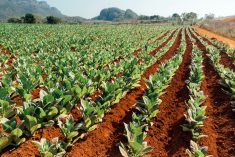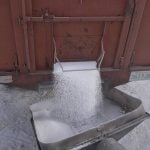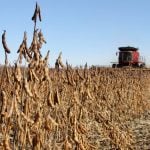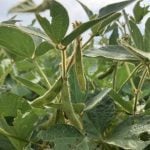CNS Canada — Representatives from Canada’s five main parties met Wednesday in Ottawa to discuss and debate farm policy ranging from risk management to transportation and rural infrastructure ahead of the Oct. 19 federal election.
The hot button issue of the debate, however, was Canada’s supply management systems for dairy, poultry and eggs.
The topic already loomed large elsewhere: trade ministers from Canada and 11 Pacific Rim countries meet Wednesday and Thursday in Atlanta for what many expect to be the final round of negotiations on a Trans-Pacific Partnership trade deal. And on Tuesday, farmers brought tractors and dairy cows into downtown Ottawa, to protest the potential implications of the TPP deal.
Read Also

U.S. grains: Soy futures post biggest monthly gain in nearly five years on China trade optimism
U.S. soybean futures climbed to a 15-month high and posted their biggest monthly gain in nearly five years on Friday following a rally fueled by the prospect of revived exports to China.
Canada’s supply management policies, which control the prices paid for milk, cheese, eggs and poultry through marketing boards, are believed to be at risk in TPP talks if other TPP countries, such as the U.S. and New Zealand, are able to deal for increased access into those markets in Canada.
Other export-focused commodity groups in Canada, such as cattle, hog and grain producer groups, are generally in favour of implementing a TPP deal.
During the debate, organized by the Canadian Federation of Agriculture, the New Democrats’ lead agriculture critic, Niagara-area MP Malcolm Allen, began and ended the debate declaring his party’s unequivocal support for supply management.
Allen continued to ask northwestern Saskatchewan MP Gerry Ritz, the Conservatives’ incumbent agriculture minister, why domestic markets are on the table in international trade agreements.
“Everything is on the table at the beginning,” said Ritz.
Ritz went on to say that if TPP final negotiations make any concessions to supply management, farmers would be compensated accordingly, leaving “zero impact on producers at the end of the day.”
Ritz was further challenged by Yves Lessard, a Bloc Quebecois candidate from Quebec’s Monteregie, who said the Conservatives were sacrificing a piece of supply management with each trade deal.
Andrew West, a Green Party candidate in the Ottawa area, said the TPP doesn’t benefit farmers on any level.
“Simply put, this hurts farmers.”
As for grain transportation within Canada, Ritz, Allen and West touched on the importance of transportation infrastructure, especially to Prairie farmers.
Infrastructure in rural communities is lacking, making it difficult for western Canadian farmers to move production from the farm to processors, Allen said.
“The NDP is going to stand up to railway companies.”
The Green Party plans to fund transportation infrastructure by cutting subsidies to oil sands.
Ritz briefly touched on rural investment, saying the Conservative government plans on supporting it through better broadband access, roads and ports.
Nova Scotia MP and incumbent Liberal agriculture critic Mark Eyking said the party plans on working directly with farmers to develop plans that work for then, especially in research and agribusiness sectors.
Drought in Western Canada means farmers are going to want to trigger risk management programs, he said.
The Liberals plan to fund research and programs that would help with market volatility, saying the current government doesn’t do enough to help farmers, citing Conservative government cuts to the AgriStability program.
“Every other developed country helps farmers when they’re in need,” he said.
Allen said he has heard farmers complain about AgriStability, and that their dislike is founded.
The NDP, he said, would sit down with farmers and see what they need, and build a program beyond bureaucracy.
EDITOR’S NOTE: Video of Wednesday’s ag leaders’ debate will be available soon on AGCanada.com’s election page, where you can now find a feed of features, articles and video on federal election issues facing farmers, by Glacier FarmMedia staff and contributors.
— Jade Markus writes for Commodity News Service Canada, a Winnipeg company specializing in grain and commodity market reporting. Follow her at @jade_markus on Twitter.












